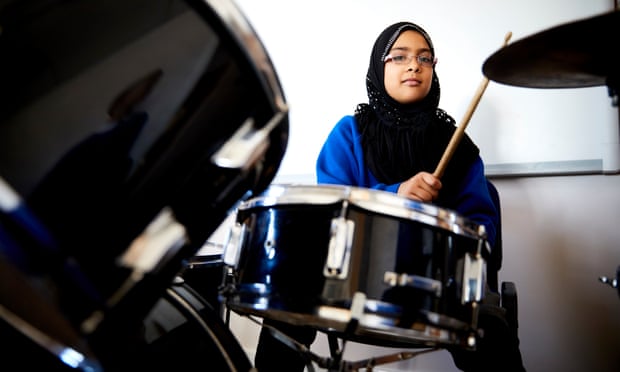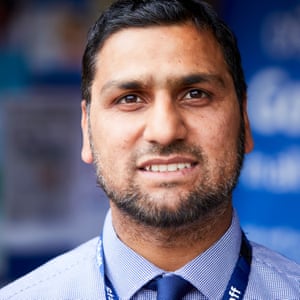How to improve the school results: not extra maths but music, loads of it
A Bradford primary school wants the world to know its newfound Sats success is down to giving all children up to six hours of music a week
by Josh Halliday
Abiha Nasir, aged nine, walks quietly into the small classroom, takes a seat, adjusts her hijab and picks up the drumsticks. A shy smile spreads across her face as she begins to play.
She was just five when she turned up at Feversham primary academy’s after-school clubs, leaving teachers astounded by her musical ability and how her confidence grew with an instrument in hand. Last year, Abiha successfully auditioned for Bradford’s gifted and talented music programme for primary school children, the first Muslim girl to do so. The assessor recorded only one word in her notes: “Wow!”
Abiha’s teachers say her talent might have gone unspotted in many schools, where subjects such as music and art are being squeezed out by pressure to reach Sats targets and climb league tables.
But at Feversham, the headteacher, Naveed Idrees, has embedded music, drama and art into every part of the school day, with up to six hours of music a week for every child, and with remarkable results. Seven years ago Feversham was in special measures and making headlines for all the wrong reasons. Today it is rated “good” by Ofsted and is in the top 10% nationally for pupil progress in reading, writing and maths, according to the most recent data. In 2011, the school was 3.2 percentage points behind the national average in English. This year 74% of its pupils achieved the expected standard in reading, writing and maths, against a national average of 53%. It is 7.1 points above the average for reading and 3.4 above for writing. In maths, the school was 2.4 points behind the national average in 2011 and is now 6.5 above it. Its results for disadvantaged pupils are well above average.

Abiha Nasir, nine, is the first Muslim girl successfully to audition for Bradford’s gifted and talented music programme for primary children.
The turnaround is even more notable given the makeup of the school: 99% of its 510 children speak English as an additional language, and half arrive at school unable to speak a word of English. The area outside the school gates, Bradford Moor, is one of the city’s most deprived and densely populated neighbourhoods. Nearly three-quarters of the surrounding population are of Pakistani, Bangladeshi or Indian heritage, compared with just over a quarter in the city as a whole, according to the 2011 census. A recent influx of refugees and a longer-term increase in the number of eastern Europeans has added to community tensions in an area where the city council has noted that different ethnic groups “don’t necessarily get on well or treat each other with respect”.
Inside the school gates, however, it’s a different story. Thirty different languages are spoken but the youngsters all learn happily alongside one another. The children practise Shakespeare and the Beatles as well as Muslim worship songs called Nasheeds. They learn Hi Low Chickalow, the playground clapping game, as well as studying the second world war and the songs of Ahmad Hussain, a Sheffield-born YouTube star who performs for the school every year.

Headteacher Naveed Idrees: ‘We were in special measures. We could have said we’re going to do more English, more maths, more booster classes. You might hit the results but the kids hate learning.’
A “tiny percentage” of Muslim parents were concerned about their children listening to pop songs or Christian music, according to Jimmy Rotheram, the school’s energetic music coordinator, but he says those concerns disappeared when they saw the progress their children were making.Once the school’s end-of-year concert would be attended only by a handful of sceptical parents, now it sells out every year. The school’s attendance has increased to 98%, as the amount of music taught to each pupil has risen. Every child will get at least two hours of music a week. As a bare minimum, each child gets a 30-minute music lesson, a half-hour follow-up lesson, plus a one-hour music assembly with a guest musician and group singing. Songs are incorporated into other classes and pupils often sing about times tables, or history.
Idrees, who became headteacher in 2013, admits the new approach was a “big risk” but he says he is now convinced it could transform other struggling schools.
“We were in special measures. We had low staff morale, parents not happy with the school, results were poor and nobody wanted to come here, we had budget issues. It’s a downward spiral when you’re there. If you’re losing kids you’re losing money, then you can’t attract teachers, those you’ve got are depressed. You get monitored by Ofsted every term and it’s all about results, results, results,” he says.
“We could have gone down the route where we said we need to get results up, we’re going to do more English, more maths, more booster classes, but we didn’t. You might hit the results but your staff morale is gone, the kids hate learning. We want kids to enjoy learning.”
The school bases its method on the Kodály approach, which involves teaching children to learn, subconsciously at first, through playing musical games. Children learn rhythm, hand signs and movement, for example, in a way that will help their reading, writing and maths. Idrees says teachers have found that asking children to memorise passages of Shakespeare’s The Tempest, for example, improves reading and writing.
Lost in the debate around Sats testing and league tables, Idrees says, is the importance of children’s mental and social development. This came to the fore in Bradford two years ago when an 11-year-old at a school on the other side of the city, Asad Khan, killed himself amid claims he had been bullied. Worried parents were knocking on headteachers’ doors across Bradford, Idrees says, concerned about their own children’s welfare

Lost in the debate around Sats testing and league tables is children’s mental and social development, says Faversham’s headteacher.
After Asad’s death, Feversham piloted a project to help children deal with failure, peer pressure and media influences. “A lot of these quiet kids, they don’t know how to deal with emotions, they don’t know how to deal with negativity,” Idrees says. At its most basic, the simple act of game-playing can help children learn social skills such as eye contact and taking turns, while listening to music in an hour-long assembly helps develop their concentration in an age dominated by smartphones and tablet computers.
The focus on creativity has improved results across the school, not just among the musically gifted, Rotheram says, adding that it is “demonstrably more effective than drilling Sats papers”.
“My hope is that headteachers and people holding purse strings, possibly even the people who make important decisions in the government, will read about our school and realise that creative subjects are not mere add-ons but essential for the progress of all pupils.”
Back in class, Abiha bursts into another impressive drum solo – so loud it can be heard from the playground outside. She practises at home, she explains, but only on her dad’s PS3 drum kit and on a tablet computer. Soon she hopes to upgrade to the real thing: “Now he’s going to sell that [PS3] drum kit and buy a real one. He’s making a different room with noise-proofed walls because the neighbours might report us.”
